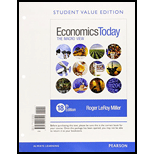
:
Reasons behind gains from specialization in production and engagement in international trade.
Concept Introduction:
International Trade: Trade between two different countries is known as international trade.
Specialization in production: A country specializes in a production process due to absolute or comparative cost advantage.
Explanation of Solution
Answer:
- Gains from specialization: Economies of scale is an advantage that the country receives from specialization. The average cost of production decreases and total output increases with higher output.
Gains from trade: Two countries trade with each other only when they find it to be mutually beneficial. The benefits the country receives through more production and consumption of goods because of specialization of production and international trade is known as gains from trade.
A country may have absolute cost advantage but international trade should depend on comparative cost advantage. The country/economy producing a commodity at a lower opportunity cost can produce it more efficiently.
An example will make it clear. Suppose there are two countries producing two goods: cars and trucks.
The below table shows the total output of both countries:
| Labor Hours | Cars | Trucks |
| Country A | 10 | 5 |
| Country B | 8 | 2 |
As country B produces both cars and trucks with less number of labor hours than country A (10 hours> 8 hours for cars and 5 hours > 2 hours for trucks), country B has an absolute advantage in the production of both cars and trucks.
Opportunity cost of producing a car in both countries are as follows:
| Opportunity Cost | Cars | Trucks |
| Country A | 10/5 = 2 trucks | 5/10 = 0.5 cars |
| Country B | 8/2 = 4 trucks | 2/8 = 0.25 cars |
If every country produces the good in which they have specialization, then the trade could take place.
If Country A produces a car, it has to spend 10 hours. It could have assembled 2 trucks in that time. Alternatively, the time spent to build a truck could have been used to make half a car.
Same explanation goes for country B as well. The time spent to finish a truck could have been used to finish 0.25 cars and time spent to build a car could have been used to finish 4 trucks.
Thus, the country A has a comparative advantage in the production of cars as it has to forego only 2 trucks to build a car instead of 4 trucks by country B.
Country B has a comparative advantage in the production of trucks as it has to forego only 0.25 cars to build a truck instead of 0.5 trucks by country A.
Want to see more full solutions like this?
Chapter 32 Solutions
Economics Today: The Macro View, Student Value Edition Plus MyLab Economics with Pearson eText --Access Card Package (18th Edition)
- how commond economies relate to principle Of Economics ?arrow_forwardCritically analyse the five (5) characteristics of Ubuntu and provide examples of how they apply to the National Health Insurance (NHI) in South Africa.arrow_forwardCritically analyse the five (5) characteristics of Ubuntu and provide examples of how they apply to the National Health Insurance (NHI) in South Africa.arrow_forward
- Outline the nine (9) consumer rights as specified in the Consumer Rights Act in South Africa.arrow_forwardIn what ways could you show the attractiveness of Philippines in the form of videos/campaigns to foreign investors? Cite 10 examples.arrow_forwardExplain the following terms and provide an example for each term: • Corruption • Fraud • Briberyarrow_forward
- In what ways could you show the attractiveness of a country in the form of videos/campaigns?arrow_forwardWith the VBS scenario in mind, debate with your own words the view that stakeholders are the primary reason why business ethics must be implemented.arrow_forwardThe unethical decisions taken by the VBS management affected the lives of many of their clients who trusted their business and services You are appointed as an ethics officer at Tyme Bank. Advise the management regarding the role of legislation in South Africa in providing the legal framework for business operations.arrow_forward

 Principles of Economics (12th Edition)EconomicsISBN:9780134078779Author:Karl E. Case, Ray C. Fair, Sharon E. OsterPublisher:PEARSON
Principles of Economics (12th Edition)EconomicsISBN:9780134078779Author:Karl E. Case, Ray C. Fair, Sharon E. OsterPublisher:PEARSON Engineering Economy (17th Edition)EconomicsISBN:9780134870069Author:William G. Sullivan, Elin M. Wicks, C. Patrick KoellingPublisher:PEARSON
Engineering Economy (17th Edition)EconomicsISBN:9780134870069Author:William G. Sullivan, Elin M. Wicks, C. Patrick KoellingPublisher:PEARSON Principles of Economics (MindTap Course List)EconomicsISBN:9781305585126Author:N. Gregory MankiwPublisher:Cengage Learning
Principles of Economics (MindTap Course List)EconomicsISBN:9781305585126Author:N. Gregory MankiwPublisher:Cengage Learning Managerial Economics: A Problem Solving ApproachEconomicsISBN:9781337106665Author:Luke M. Froeb, Brian T. McCann, Michael R. Ward, Mike ShorPublisher:Cengage Learning
Managerial Economics: A Problem Solving ApproachEconomicsISBN:9781337106665Author:Luke M. Froeb, Brian T. McCann, Michael R. Ward, Mike ShorPublisher:Cengage Learning Managerial Economics & Business Strategy (Mcgraw-...EconomicsISBN:9781259290619Author:Michael Baye, Jeff PrincePublisher:McGraw-Hill Education
Managerial Economics & Business Strategy (Mcgraw-...EconomicsISBN:9781259290619Author:Michael Baye, Jeff PrincePublisher:McGraw-Hill Education





